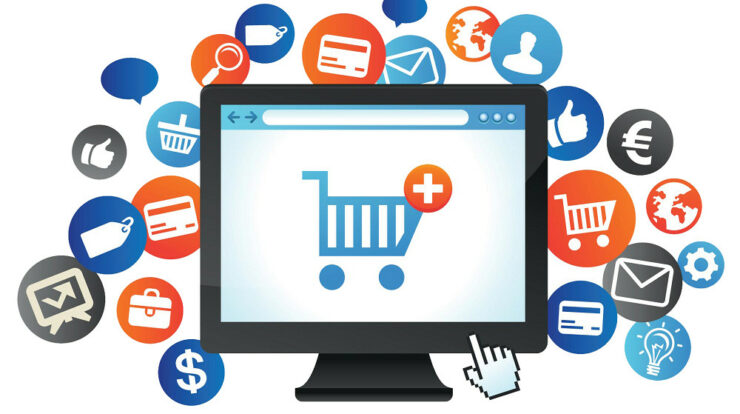
You don’t need a physical, brick-and-mortar store to sell a pen or real estate. eCommerce platforms have you covered if you focus on adding value to your target customers. The whole procedure is inexpensive, time-saving, and user-friendly! In addition, starting a business is becoming simpler due to the combined forces of eCommerce and the internet. Using the eCommerce platforms available, you may create your virtual “home base.” As a result, the eCommerce industry is quickly expanding and creating new possibilities for businesses. According to estimates, the eCommerce industry generated $2.3 trillion in sales in 2017, which is expected to quadruple by 2021.
Consider Amazon, eBay, Alibaba, and others; you can see how their businesses are growing in the online realm. However, these household brands and glowing numbers conceal the enormous pressures that eCommerce businesses endure. Growing customer expectations and severe competition have resulted in razor-thin margins, making it challenging for businesses to thrive in this virtual environment. To remain ahead of the market and succeed, eCommerce businesses must increase their networking, keep an eye on their rivals, use the newest technology, and improve customer service. Nonetheless, despite the strong rivalry, the eCommerce industry offers enormous potential in a variety of categories, including:
1 – Eco-friendly baby toiletries.
2 – Natural skincare products.
3 – Handmade toys and other products for pet owners.
4 – Print-on-demand apparel.
5 – Fitness gears.
6 – Gluten-free and Organic foods on demand.
7 – Online courses and more.
Why Is Choosing The Appropriate eCommerce Platform Critical For Your Business?
It is comparable to choosing an actual brick-and-mortar store. Building an eCommerce website involves several factors, including cost, reputation, and hazards. And if anything goes wrong, your whole business suffers. Finally, you are compelled to shift platforms, which incurs more costs and effort, not to mention headaches. As a result, spare yourself the effort and invest in the correct platform. But how precisely are you going to do this? Consider the following points.
Price
Well, if you own a small or medium-sized business, price is an important factor to consider. Offer a platform that provides the necessary tools, features, and usability at a fair price.
Back-end Tools
Ensure that your chosen platform provides crucial back-end tools to support your website. For example, it might provide access to WordPress plugins, app administration systems, SKU and CSS support, and other features. Everything on the back-end must be easily accessible, from inventory management to content management.
Scalability
As your business expands, your online store will need additional products, payment alternatives, and so on. As a result, your chosen platform should be scalable without interfering with your business processes.
Performance And Speed
When a user visits your store, the performance and page loading speed must be satisfactory. It keeps them returning to your site to help you grow your business. As a result, even if you utilize several add-ons, plugins, and the like, your host must provide exceptional performance and speed.
User Experience
To improve user experience, use a technology your end users will find simple. For example, when customers are looking for a product or service, the website should not make it difficult for them. Similarly, make that the platform is not too difficult for your staff to manage. Instead, it must be simple to offer without sacrificing efficiency.
Security
Cybercrime is on the increase right now. And you understand the significance of your online store’s security. It endangers your reputation and business and your client’s data. As a result, it offers a platform that may provide top-tier security to prevent security breaches in the long run.
Customer Service
Many businesses disregard this factor. As a business, you understand the benefit of excellent customer service. You must constantly be ready to answer your clients’ inquiries and assist them. Similarly, choose one that can provide you with timely customer service if you need it. Next, let’s look at some of the top business solutions.
12+ Best eCommerce Platforms 2022
eCommerce Platforms you can use for small to medium businesses.
1. Ecwid
The first on our list of the best eCommerce Platforms is Ecwid. With Ecwid by Lightspeed, you can sell anywhere, at any time, and watch your business grow. Ecwid by Lightspeed makes it simple for small business owners to sell online. Well, you don’t need to hire an expensive developer or have unique expertise to start an online store. Even a youngster can set up an online store in less than an hour. Create a free Ecwid account easily and follow the wizard instructions. Ecwid allows you to sell on various platforms, including websites, social media (Instagram, TikTok, Facebook, and others), and marketplaces (like Amazon). And you can manage everything from a single dashboard.
2. Adobe Commerce
Adobe Commerce, one of the best open source eCommerce platforms, offers many helpful and intriguing features. Many small and large businesses benefit from Adobe Commerce’s flexibility and strength in their online marketplaces. It efficiently constructs your store so that you may run your business effectively. It offers limitless customization options to let you shape your business exactly as you want it. You receive a lot of templates, widgets, add-ons, and other things that are constantly updated. Adobe Commerce functions incredibly effectively in SEO to boost your online exposure. Well, the high-performance platform is quick to address any faults that arise. Online retailers that use this platform run well on various platforms, including mobile phones. The Adobe Commerce platform enables sales platforms like Amazon. Adobe Commerce is great for providing the optimum sales experience, and the software can be downloaded for free.
3. Opencart
Choose Opencart for complete control over the design of your online store. It is one of the best open source eCommerce platforms that allows you to create, run, and expand your business exactly as you want. The simple-to-use platform makes it simple to get started with your digital store. Enjoy the platform’s openness, free updates, and downloads with no monthly costs. Along with an in-built SEO, the robust administration lets you manage your products, orders, customers, promotional codes, tax laws, and more. Choose from over 13,000 themes and modules to enhance the functionality of your store. The devoted customer support of Opencart is always ready at your disposal in case of difficulties. In addition, Opencart has integrated the world’s most well-known payment gateways for safe transactions, such as PayPal, Amazon Payments, FedEx, Skrill, and others.
4. Weebly
The Weebly is an excellent choice for small and medium-sized businesses wishing to build a low-cost website. To get started, you do not need to be tech-savvy; only the fundamentals will suffice. It also offers you to promote and sell your products by adding relevant articles to your blog. You also receive a plethora of fascinating and professional themes. Building, administering, and amending your website is simple, even from a mobile device.
It offers complete customization and a large selection of professionally designed themes. You may create galleries, unique backgrounds, and presentations for your business. It also provides third-party connectors for your store and SEO tools to help you stand out. In addition, square powers Weebly’s transactions, so you can rely on the platform for all your payments. The simple platform is free for basic usage, but you can subscribe to the Pro edition for $12/month and get $100 in Google ad credits and a free domain.
5. BigCommerce
BigCommerce allows you to create a distinct and robust digital store without sacrificing scalability, stability, or security. It enables your business to rise above complexity by offering vast and specialized services to improve your brand for growth. Build a unique storefront design using custom themes, including HTML, Javascript, and CSS. You may customize the checkout process using a server-to-server checkout SDK and API. Make a mobile-responsive store, preview before publishing, and build the store on WordPress. Increase traffic to your site by utilizing SEO-friendly URLs and Metadata. BigCommerce accelerates your site using Google Cloud infrastructure, Akamai Image Manager, and Google AMP. Customize your products with drag-and-drop functionality and create 70+ native promos and discounts. BigCommerce supports a variety of digital wallets, including Apple Pay, PayPal, and Amazon Pay.
6. WooCommerce
The next on our list of the best eCommerce Platforms is WooCommerce. It may be used to add a shopping cart to an existing WordPress site. You may use this WP plugin instead of building a new platform. It provides adjustable shipping choices and 140 region-specific secure payment alternatives such as PayPal, Stripe, Google Pay, Apple Pay, and others. The highly configurable platform enables you to expand the functionality of your store by utilizing official WooCommerce extensions such as marketing connections, store improvement, multichannel, point of sale, and more. The platform, built using the REST API, can be linked with nearly any service and is scalable as your brand grows. You can effortlessly post your products on Google Shopping, promote the store on social media platforms such as Facebook, and contact customers using MailChimp. Use Google Analytics to monitor and track your marketing activities.
7. Shopify
Looking for a system with all the point-of-sale features you need to launch, run, and grow your brand? Shopify has got your back. Begin your business adventure by selling your products everywhere, including on social media and online marketplaces. Shopify offers marketing tools to assist you in creating, executing, and evaluating campaigns on Google and Facebook. For your convenience, manage your orders, payments, and shipping via the same dashboard. Then, access the CSS and HTML codes to customize your website.
With over 3200 apps capable of directly integrating with Shopify, you may add incredible functionality and features to your site. It offers over 70 professional themes designed by well-known designers like Pixel Union, Happy Cog, and others. The Shopify offers a blogging platform where you can enlighten and educate your audience by producing high-quality posts. Shopify offers a free 256-bit SSL certificate to safeguard any information on your site. It also provides secure payment gateways and the ability to pay using credit cards such as Visa, American Express, and Mastercard. Join the 1 million businesses in 175 countries that have already achieved over $155 billion in sales with Shopify.
8. Prestashop
Prestashop, designed with the unique needs of different businesses, assists you in creating the completely customized store of your dreams! It offers the features, functionality, and performance required to create and grow your brand. Add your products fast, define their features, and easily customize them. You may set price restrictions, create coupons, choose discount modes, and customize shipping. Prestashop also offers SEO-friendly storefronts where you can monitor your SEO ratings, and it lets you connect your digital store to social media networks for more engagement and traffic. Periodic reports and visitor insights may also track your marketing efforts. Prestashop is now accessible in over 75 languages, allowing you to expand your user base. Run several digital storefronts from a single back office to save cost and time. Join the over 300,000 merchants and sell your products across borders.
9. Sylius
By leveraging the open-source platform Sylius, you can give your store a distinct look and feel. It is entirely built using the Symfony PHP framework. It combines excellent code quality, sound concepts, and testing processes to make development easier and your customers more comfortable. The platform offers built-in APIs that allow you to easily build mobile apps for Android and iOS and progressive web apps. As a result, you may sell your products on whatever device your target customers own. Integrate your site with many tools required for your business to flourish, such as CRM, ERP, inventory, emails, etc. Sylius is readily deployable on various hosting platforms, including Cloudways, Nexcess, and others.
10. Drupal
Well, build an ambitious digital store with Drupal by integrating the best marketing, fulfillment, and payment tools to entice a larger consumer base. You may manage your content alongside product data models, including product pages and search interfaces. Around 1 million developers from all over the globe contribute to Drupal, making it a robust and secure platform. It protects your store by encrypting the database, controlling access, providing security reports, automating upgrades, and preventing malicious actions and DoS attacks.
The Drupal offers marketing automation through social media, emails, CRM, SEO, and other channels. It also functions as a content repository that can be accessed through an API. It lets you customize information such as geolocation, device type, browser history, behavior taxonomy, and so on to offer appropriate content to your visitors. The platform is multilingual, with over 100 languages available. However, you must manage the installation and settings since it is open-source. Instead, you may use managed to host to concentrate on your main business.
11. Saleor
Easily deploy your online store with Saleor and benefit from best-in-class performance and flexibility to manage and run your business. Its revolutionary GraphQL API enables smooth integration of your store with many systems such as CRM, CMS, fulfillment APIs, etc. It allows you to utilize the PWA storefront or JavaScript SDK on the front end and choose a new platform or language of your choice. You may manage your product bundles, groups, and customizations any way you choose. It offers support for currencies, languages, and translations. Track your firm’s growth by collecting and analyzing data in the business to shape it in the long run. Create a strong and secure store utilizing current tools to future-proof your brand. It also offers easy Magento transfer and employs clean code to add new and innovative features to your store’s benefit.
12. Sellfy
The next on our list of the best eCommerce Platforms is Sellfy. It offers a simple but powerful platform for creating an online store to create tangible items, subscriptions, or digital products. This is for you if you despise complexity while still seeking effective results. You may sell your products on YouTube, Instagram, or Soundcloud by inserting a “Buy Now” button or providing a simple link on your website. You may increase your sales with email marketing, upselling features, and discount coupons with no additional integrations. Customize your store by adding your logo, creating layouts, and changing colors to match your brand. The bilingual platform offers for mobile users, allowing them to access your store through mobile and desktop. Sellfy takes payments from over 200 countries and uses secure payment methods like PayPal and Stripe. Analytical insights may track best-performing products, traffic channels, and top business locations.
13. Wix Stores
Wix can help you create a professional-looking and effective online store to sell your products on various sales channels such as Instagram and Facebook. Choose from 500+ designs and customize your store design with powerful tools to reach a large audience on mobile and desktop. It has over 100 design features, effects, and excellent product galleries to help you grow your online presence. Set up and manage your storefront depending on your needs by selecting a wishlist, mini-cart, rapid add-to-cart, and other features.
You may customize each site page to your business’s specific requirements. Use the Modalyst drop-shipping platform to source thousands of high-quality products to expand your portfolio. You can also configure your shipping criteria and use worldwide carriers like FedEx, USPS, and others to provide real-time shipping estimates to your customers at checkout. Wix ensures payment security by enabling you to choose from prominent payment providers, such as PayPal, Wix Payments, credit/debit cards, and so on, and accepts 40+ currencies. You may also use CSV files to move the product catalog to Wix.
14. 3dcart
The last on our list of the best eCommerce Platforms is 3dcart. Gain a competitive advantage by leveraging 3dcart’s robust and secure eCommerce platform. Well, it offers an all-in-one solution for creating a robust store, including tools for inventory management, design, sales monitoring, and more. Connect your store to Amazon, eBay, Facebook, and other customers to increase your client base and get rewards. Grow your business with built-in email marketing and track consumer insights with dependable analytics tools. Interestingly, it provides tools for cart abandonment recovery that might instantly engage your visitors and persuade them to return. In addition, the platform optimizes your site for SEO to increase traffic and visibility. 3dcart has a Visa PCI certification and strong security features to ensure that all transactions are safe. It supports over 200 payment sources, including PayPal, Stripe, and others. You may also effortlessly integrate your store with FedEx, UPS, Royal Mail, USPS, and other shipping companies to provide safe shipping.
The Bottom Line: eCommerce Platforms
If you’re ready to expand beyond your brick-and-mortar store, it’s time to build a scalable digital store on a dependable and feature-rich eCommerce platform. Then, choose the proper service provider depending on your business needs and budget to earn brownie points that will save you time and business in the long run.


